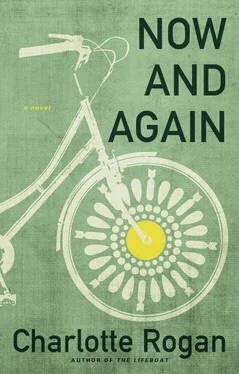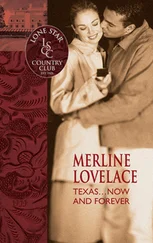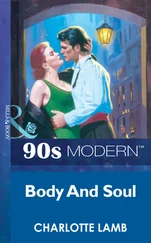“Thank you, young man. Yes, exactly. I believe there is.”
“What one is that?” Penn felt increasingly desperate, and while it occurred to him that he was listening to an old man’s ramblings, he was certain the professor possessed the kernel of truth he was looking for.
Now it was the old man’s turn to say, “What? What one is what?”
“The question!” cried Penn, but the professor’s response was interrupted when a volunteer in a red apron came with a ring of keys to open the door for the long line of people that had formed on the sidewalk.
“What’s for dinner?” shouted the professor.
“Come in and you’ll find out,” said the volunteer.
“I’m hoping it’s not meat loaf,” said a scrawny woman who was standing near them.
At the sound of the keys, another horde of people had materialized, and now they were jostling for position in the line. The professor used his stick to clear a space for himself as the volunteer called out, “One at a time, please! There’s plenty for everybody!”
“But it’s not yet five!” cried Penn. His wristwatch, which had been given to him by his father when he went off to college, was finely calibrated and had neither lost nor gained a minute in the nine years he had owned it.
“One at a time,” the volunteer called again. Cooking smells wafted out the door to mingle with the exhaust from a passing bus and the stink of rotting garbage that curled up from the curb.
“What’s the one philosophical question?” Penn was shouting now, but the old man had scuttled up to the door and was vanishing through it. “Can you at least tell me that?”
The volunteer smiled benignly at Penn. “It’s hard to think about philosophy when you’re hungry,” she said. “Come back after dinner. Maybe you’ll get your answer then.”
Penn slung his duffel over his shoulder and wandered through a nearby park where an art class was experimenting with line and form. “Solids and voids,” said a bearded man when Penn stopped to peer over his shoulder at the abstractions on his canvas. The face of Penn’s watch showed 6:04. It was too late to shower, too late to change his clothes, too late to be on time for Louise. He walked another block west and turned north on the Avenue of the Americas. It was seventeen blocks to the restaurant overlooking Central Park. He imagined hailing a cab and getting locked in rush-hour traffic or jogging up the avenue on foot, becoming sweatier with each block while Louise tapped her long fingers on the tablecloth and ordered a bottle of imported water and then a selection of appetizers when he still didn’t appear. He saw her choosing an expensive wine and sending it back when it wasn’t quite what she expected.
Suddenly it seemed easier to go back to the war than to face Louise without a ring, without a life plan, without a polished sense of who he was or how he was going to answer life’s big questions. With only a vague sense of what those questions were. All around him, people were making small protests against fate: the taxicab drivers fighting over a customer, the fat woman enjoying a candy bar, the thin woman shaking a tambourine and belting out a gospel song. Even the proprietor of a nearby newsstand waved cheerfully at the headlines: MARKETS SLAMMED BY BIG OIL, RUSSIA WIDENS ATTACKS ON GEORGIA, CRISIS DEEPENS AS BIG BANKS FAIL, OKLAHOMA WOMAN SOUGHT IN LEAKED DOC PROBE. He followed a carefree young woman who tossed her hair and crossed against the light. Then Times Square exploded in front of him, and he felt a wave of happiness wash over him, or if it wasn’t happiness, it was at least a sense that cross-purposes and conflicting messages and questions with no clear answers weren’t necessarily bad and might even be evidence of progress. He told himself that he had done a little good in the warehouse. He and the men had started something, and whether or not they finished it wasn’t up to him. He’d call Louise. Or he’d leave a message with the maître d’ of the restaurant. He’d send her flowers. Meanwhile, he had a plane to catch.
On the plane, Sinclair went over his orders again. He was being assigned to an engineer battalion that had undergone intensive stateside training with a new generation of robotic devices that were now being deployed overseas. The first wave of combat robots had been plagued with technical issues and precipitously pulled from the theater after reports of malfunction and friendly fire. But improvements had been made and hopes were high that the new devices would save soldiers’ lives. He re-read the spec sheets: the Groundhog was equipped with an M249 light machine gun that could shoot a thousand rounds per minute with 100 percent accuracy; the Parakeet could fly thirty miles per hour and hover in place as long as its power source lasted, which depended on factors like wind resistance and operator skill. If only they’d had a robot scouting the supply route that terrible day. But now he was being given a chance to save future soldiers even if there was nothing he could do about the past.
He put his head against the seat back and closed his eyes, happier than he’d been in a long time. He wondered what the new troops would be like. He wondered if there would be a businessman like Kelly or a computer whiz like Le Roy or an escape artist like Pig Eye — Edwards, he corrected himself. Paul Edwards was his name. Or a poet like Danny or a captain like himself, given leadership before he was completely ready for it. He knew that in some respects the men and women were all unique — of course they were — but in other respects, they were all the same.
12.2 Maggie
It was early morning when the last truck driver let Maggie out at the Red Bud exit. Now and then a car sped off the highway heading toward town, but she didn’t try to flag it down. What if it was someone she knew? She wouldn’t know how to answer the inevitable questions and she didn’t want to lie, so she walked with her head down, eyes glued to the dirt. Every time she caught a glimpse of her shadow stretching behind her, she thought it might be Dino, but of course it wasn’t. She tried to decide whom she had let down more — God, because she hadn’t kept her promise to him, or Tomás and George, because nothing she had done for them had made a tangible difference. She remembered how she had declared so confidently to anyone who would listen, “Saving someone else’s son is the only way to save my own.” But she hadn’t saved someone else’s son. So far, she hadn’t saved anybody. All she’d done was to raise the hopes of people who couldn’t stand too much more disappointment, which didn’t seem particularly kind under the circumstances. When she turned onto Old Oak Road, her heart started knocking like the engine of the truck on a cold day. Lyle! she thought. Will! And then she knew who it was she had let down most of all.
The driveway was hidden by a bend in the road. First the hayfield came into sight, nailed in place by the big old oak, and then the mailbox, which hung open as if panting in the June heat. It was all uphill from there — up the last stretch of road, up the driveway, up the cracked front walk with its embellishments of dandelions and tufted grass, up the steps and across the worn porch with its broken boards and rusted nails. The door was locked — why had Lyle taken to locking it? Maggie didn’t have a key, so she jimmied a loose window and climbed through it into the dining alcove, where she had hoped to find Lyle and Will drinking their Saturday morning coffee in companionable silence. But Will had joined the army, and the alcove was empty even of Lyle.
She saw by the battery-powered kitchen clock that it was already ten o’clock. Of course Lyle would be up and about by now. She washed her face and fixed a tall glass of water, which she sipped as she tidied first the kitchen and then the living room. She had always been too busy to clean properly. She had always been rushing from one thing to another: taking a hurried shower before her family was awake, eating breakfast as she slapped together the sandwiches for lunch, reminding Will about his homework and hustling everybody out the door. And then the busy day at work before coming home to dinner, household chores, and bed. Now she could take her time. Will’s room was spotless, so she started in on Lyle’s room, folding the scattered clothing and making up his bed with fresh sheets. Her bed — rather, hers and Lyle’s. It felt good to concentrate on each task, on each object, on each slow tick of the clock that was marking the seconds until Lyle would come home to find her waiting for him with dinner bubbling on the stove. She unpacked her duffel, putting the dirty clothes in the laundry basket with the sheets, the worn-out shoes on the rack in the closet, the sweaters in the sweater drawer — no, sweaters in the closet. She was pushing the sweater drawer shut when she realized it should be full of the evidence she had carefully hidden inside magazine covers all those months ago, but the evidence was gone. Lyle! What had Lyle done?
Читать дальше












